RLGN 360: SCORRE Lesson Worksheet - Biblical Texts and Themes
VerifiedAdded on 2023/04/20
|20
|4811
|265
Homework Assignment
AI Summary
This document presents a student's completed SCORRE (Subject, Central Theme, Objective, Proposition, Response, Resources, Evaluation) lesson worksheet for the course RLGN 360. It includes analyses of three biblical passages: Genesis 1:26-28 (Image of God), Exodus 13:17-15:21 (Victory at the Red Sea), and Matthew 5:1-7:29 & Luke 6:20-45 (The Lovely Beatitudes). Each analysis identifies the subject, central theme, and objective of the passage, followed by a proposition, response, key word, and rationale. The rationale provides supporting arguments and biblical references. The evaluation section assesses the clarity and consistency of the objective, key word, and rationale. The worksheet also includes notes on mistakes to avoid when teaching these lessons, emphasizing the importance of focusing on the text's main points and avoiding contemporary interpretations that may overshadow the original message. The student uses the SCORRE method to dissect and understand the core messages within each selected scripture, aiming to present them effectively to a young adult audience.
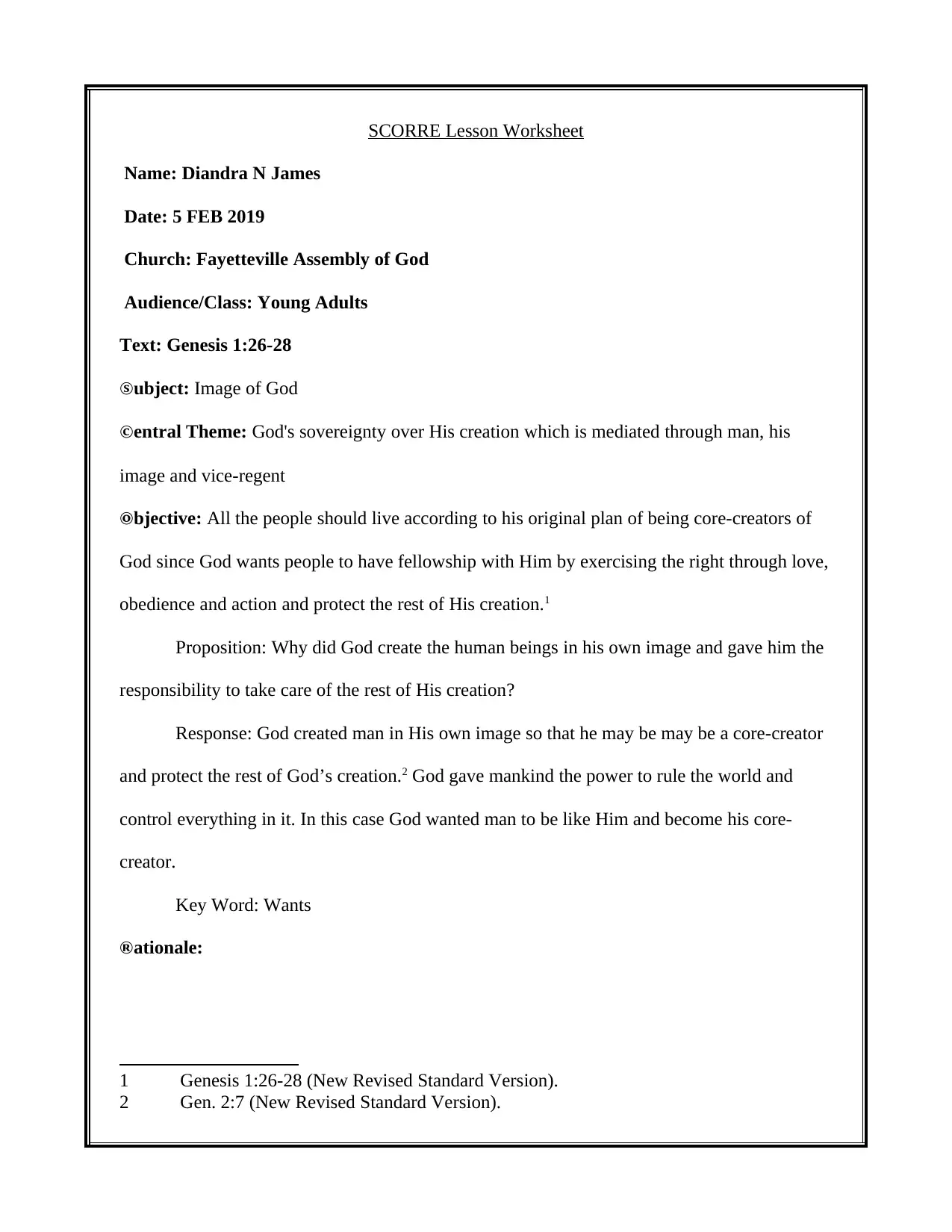
SCORRE Lesson Worksheet
Name: Diandra N James
Date: 5 FEB 2019
Church: Fayetteville Assembly of God
Audience/Class: Young Adults
Text: Genesis 1:26-28
Ⓢubject: Image of God
Ⓒentral Theme: God's sovereignty over His creation which is mediated through man, his
image and vice-regent
Ⓞbjective: All the people should live according to his original plan of being core-creators of
God since God wants people to have fellowship with Him by exercising the right through love,
obedience and action and protect the rest of His creation.1
Proposition: Why did God create the human beings in his own image and gave him the
responsibility to take care of the rest of His creation?
Response: God created man in His own image so that he may be may be a core-creator
and protect the rest of God’s creation.2 God gave mankind the power to rule the world and
control everything in it. In this case God wanted man to be like Him and become his core-
creator.
Key Word: Wants
Ⓡationale:
1 Genesis 1:26-28 (New Revised Standard Version).
2 Gen. 2:7 (New Revised Standard Version).
Name: Diandra N James
Date: 5 FEB 2019
Church: Fayetteville Assembly of God
Audience/Class: Young Adults
Text: Genesis 1:26-28
Ⓢubject: Image of God
Ⓒentral Theme: God's sovereignty over His creation which is mediated through man, his
image and vice-regent
Ⓞbjective: All the people should live according to his original plan of being core-creators of
God since God wants people to have fellowship with Him by exercising the right through love,
obedience and action and protect the rest of His creation.1
Proposition: Why did God create the human beings in his own image and gave him the
responsibility to take care of the rest of His creation?
Response: God created man in His own image so that he may be may be a core-creator
and protect the rest of God’s creation.2 God gave mankind the power to rule the world and
control everything in it. In this case God wanted man to be like Him and become his core-
creator.
Key Word: Wants
Ⓡationale:
1 Genesis 1:26-28 (New Revised Standard Version).
2 Gen. 2:7 (New Revised Standard Version).
Paraphrase This Document
Need a fresh take? Get an instant paraphrase of this document with our AI Paraphraser
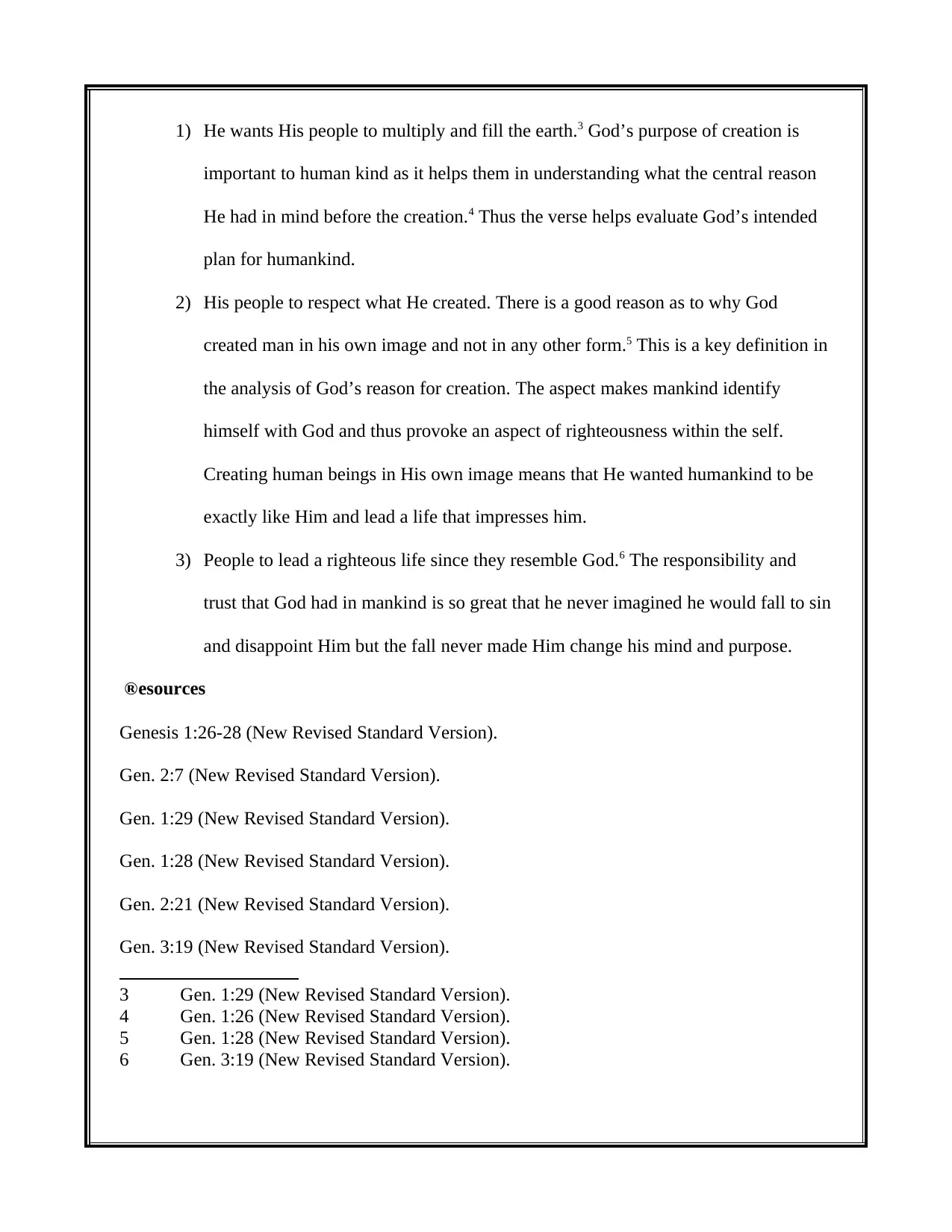
1) He wants His people to multiply and fill the earth.3 God’s purpose of creation is
important to human kind as it helps them in understanding what the central reason
He had in mind before the creation.4 Thus the verse helps evaluate God’s intended
plan for humankind.
2) His people to respect what He created. There is a good reason as to why God
created man in his own image and not in any other form.5 This is a key definition in
the analysis of God’s reason for creation. The aspect makes mankind identify
himself with God and thus provoke an aspect of righteousness within the self.
Creating human beings in His own image means that He wanted humankind to be
exactly like Him and lead a life that impresses him.
3) People to lead a righteous life since they resemble God.6 The responsibility and
trust that God had in mankind is so great that he never imagined he would fall to sin
and disappoint Him but the fall never made Him change his mind and purpose.
Ⓡesources
Genesis 1:26-28 (New Revised Standard Version).
Gen. 2:7 (New Revised Standard Version).
Gen. 1:29 (New Revised Standard Version).
Gen. 1:28 (New Revised Standard Version).
Gen. 2:21 (New Revised Standard Version).
Gen. 3:19 (New Revised Standard Version).
3 Gen. 1:29 (New Revised Standard Version).
4 Gen. 1:26 (New Revised Standard Version).
5 Gen. 1:28 (New Revised Standard Version).
6 Gen. 3:19 (New Revised Standard Version).
important to human kind as it helps them in understanding what the central reason
He had in mind before the creation.4 Thus the verse helps evaluate God’s intended
plan for humankind.
2) His people to respect what He created. There is a good reason as to why God
created man in his own image and not in any other form.5 This is a key definition in
the analysis of God’s reason for creation. The aspect makes mankind identify
himself with God and thus provoke an aspect of righteousness within the self.
Creating human beings in His own image means that He wanted humankind to be
exactly like Him and lead a life that impresses him.
3) People to lead a righteous life since they resemble God.6 The responsibility and
trust that God had in mankind is so great that he never imagined he would fall to sin
and disappoint Him but the fall never made Him change his mind and purpose.
Ⓡesources
Genesis 1:26-28 (New Revised Standard Version).
Gen. 2:7 (New Revised Standard Version).
Gen. 1:29 (New Revised Standard Version).
Gen. 1:28 (New Revised Standard Version).
Gen. 2:21 (New Revised Standard Version).
Gen. 3:19 (New Revised Standard Version).
3 Gen. 1:29 (New Revised Standard Version).
4 Gen. 1:26 (New Revised Standard Version).
5 Gen. 1:28 (New Revised Standard Version).
6 Gen. 3:19 (New Revised Standard Version).
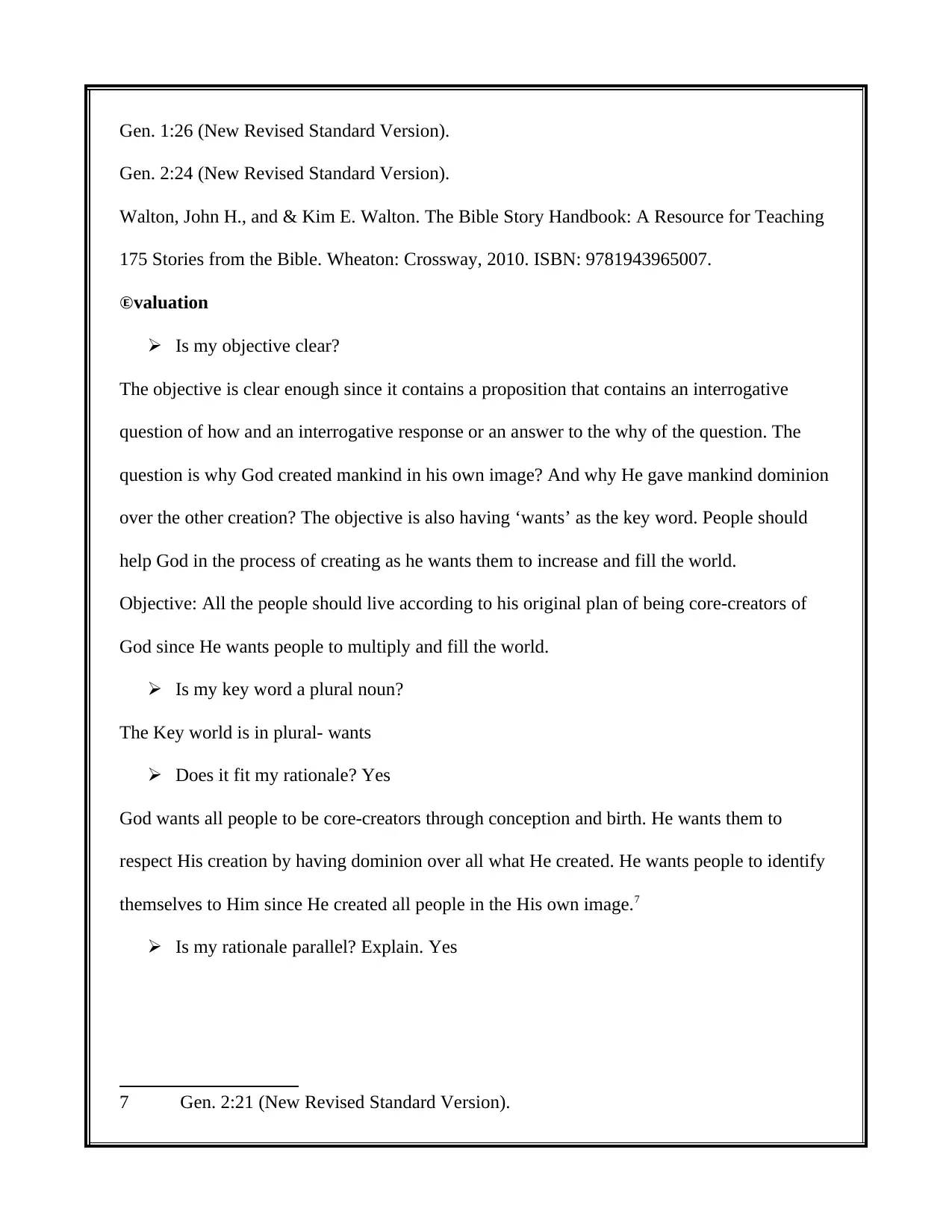
Gen. 1:26 (New Revised Standard Version).
Gen. 2:24 (New Revised Standard Version).
Walton, John H., and & Kim E. Walton. The Bible Story Handbook: A Resource for Teaching
175 Stories from the Bible. Wheaton: Crossway, 2010. ISBN: 9781943965007.
Ⓔvaluation
Is my objective clear?
The objective is clear enough since it contains a proposition that contains an interrogative
question of how and an interrogative response or an answer to the why of the question. The
question is why God created mankind in his own image? And why He gave mankind dominion
over the other creation? The objective is also having ‘wants’ as the key word. People should
help God in the process of creating as he wants them to increase and fill the world.
Objective: All the people should live according to his original plan of being core-creators of
God since He wants people to multiply and fill the world.
Is my key word a plural noun?
The Key world is in plural- wants
Does it fit my rationale? Yes
God wants all people to be core-creators through conception and birth. He wants them to
respect His creation by having dominion over all what He created. He wants people to identify
themselves to Him since He created all people in the His own image.7
Is my rationale parallel? Explain. Yes
7 Gen. 2:21 (New Revised Standard Version).
Gen. 2:24 (New Revised Standard Version).
Walton, John H., and & Kim E. Walton. The Bible Story Handbook: A Resource for Teaching
175 Stories from the Bible. Wheaton: Crossway, 2010. ISBN: 9781943965007.
Ⓔvaluation
Is my objective clear?
The objective is clear enough since it contains a proposition that contains an interrogative
question of how and an interrogative response or an answer to the why of the question. The
question is why God created mankind in his own image? And why He gave mankind dominion
over the other creation? The objective is also having ‘wants’ as the key word. People should
help God in the process of creating as he wants them to increase and fill the world.
Objective: All the people should live according to his original plan of being core-creators of
God since He wants people to multiply and fill the world.
Is my key word a plural noun?
The Key world is in plural- wants
Does it fit my rationale? Yes
God wants all people to be core-creators through conception and birth. He wants them to
respect His creation by having dominion over all what He created. He wants people to identify
themselves to Him since He created all people in the His own image.7
Is my rationale parallel? Explain. Yes
7 Gen. 2:21 (New Revised Standard Version).
⊘ This is a preview!⊘
Do you want full access?
Subscribe today to unlock all pages.

Trusted by 1+ million students worldwide
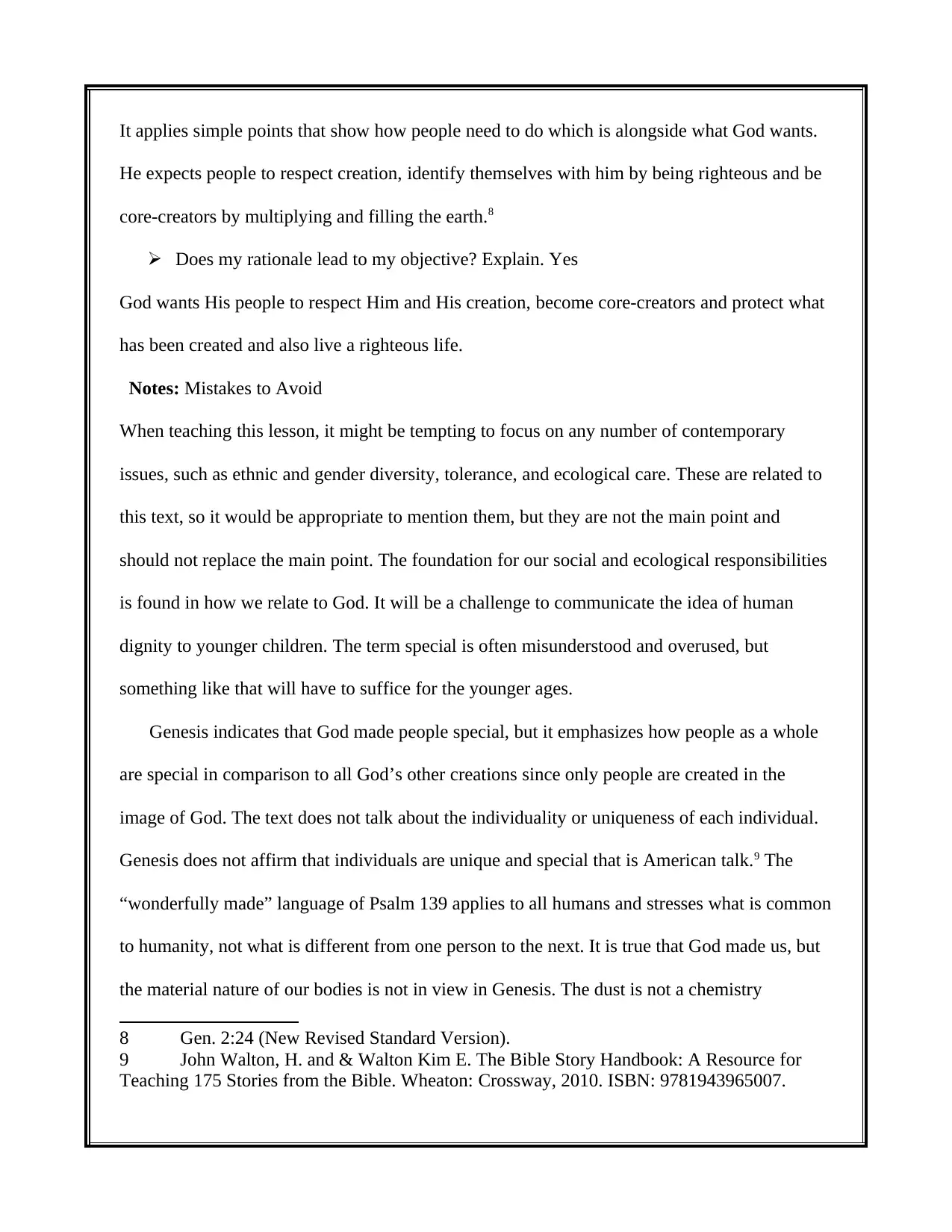
It applies simple points that show how people need to do which is alongside what God wants.
He expects people to respect creation, identify themselves with him by being righteous and be
core-creators by multiplying and filling the earth.8
Does my rationale lead to my objective? Explain. Yes
God wants His people to respect Him and His creation, become core-creators and protect what
has been created and also live a righteous life.
Notes: Mistakes to Avoid
When teaching this lesson, it might be tempting to focus on any number of contemporary
issues, such as ethnic and gender diversity, tolerance, and ecological care. These are related to
this text, so it would be appropriate to mention them, but they are not the main point and
should not replace the main point. The foundation for our social and ecological responsibilities
is found in how we relate to God. It will be a challenge to communicate the idea of human
dignity to younger children. The term special is often misunderstood and overused, but
something like that will have to suffice for the younger ages.
Genesis indicates that God made people special, but it emphasizes how people as a whole
are special in comparison to all God’s other creations since only people are created in the
image of God. The text does not talk about the individuality or uniqueness of each individual.
Genesis does not affirm that individuals are unique and special that is American talk.9 The
“wonderfully made” language of Psalm 139 applies to all humans and stresses what is common
to humanity, not what is different from one person to the next. It is true that God made us, but
the material nature of our bodies is not in view in Genesis. The dust is not a chemistry
8 Gen. 2:24 (New Revised Standard Version).
9 John Walton, H. and & Walton Kim E. The Bible Story Handbook: A Resource for
Teaching 175 Stories from the Bible. Wheaton: Crossway, 2010. ISBN: 9781943965007.
He expects people to respect creation, identify themselves with him by being righteous and be
core-creators by multiplying and filling the earth.8
Does my rationale lead to my objective? Explain. Yes
God wants His people to respect Him and His creation, become core-creators and protect what
has been created and also live a righteous life.
Notes: Mistakes to Avoid
When teaching this lesson, it might be tempting to focus on any number of contemporary
issues, such as ethnic and gender diversity, tolerance, and ecological care. These are related to
this text, so it would be appropriate to mention them, but they are not the main point and
should not replace the main point. The foundation for our social and ecological responsibilities
is found in how we relate to God. It will be a challenge to communicate the idea of human
dignity to younger children. The term special is often misunderstood and overused, but
something like that will have to suffice for the younger ages.
Genesis indicates that God made people special, but it emphasizes how people as a whole
are special in comparison to all God’s other creations since only people are created in the
image of God. The text does not talk about the individuality or uniqueness of each individual.
Genesis does not affirm that individuals are unique and special that is American talk.9 The
“wonderfully made” language of Psalm 139 applies to all humans and stresses what is common
to humanity, not what is different from one person to the next. It is true that God made us, but
the material nature of our bodies is not in view in Genesis. The dust is not a chemistry
8 Gen. 2:24 (New Revised Standard Version).
9 John Walton, H. and & Walton Kim E. The Bible Story Handbook: A Resource for
Teaching 175 Stories from the Bible. Wheaton: Crossway, 2010. ISBN: 9781943965007.
Paraphrase This Document
Need a fresh take? Get an instant paraphrase of this document with our AI Paraphraser
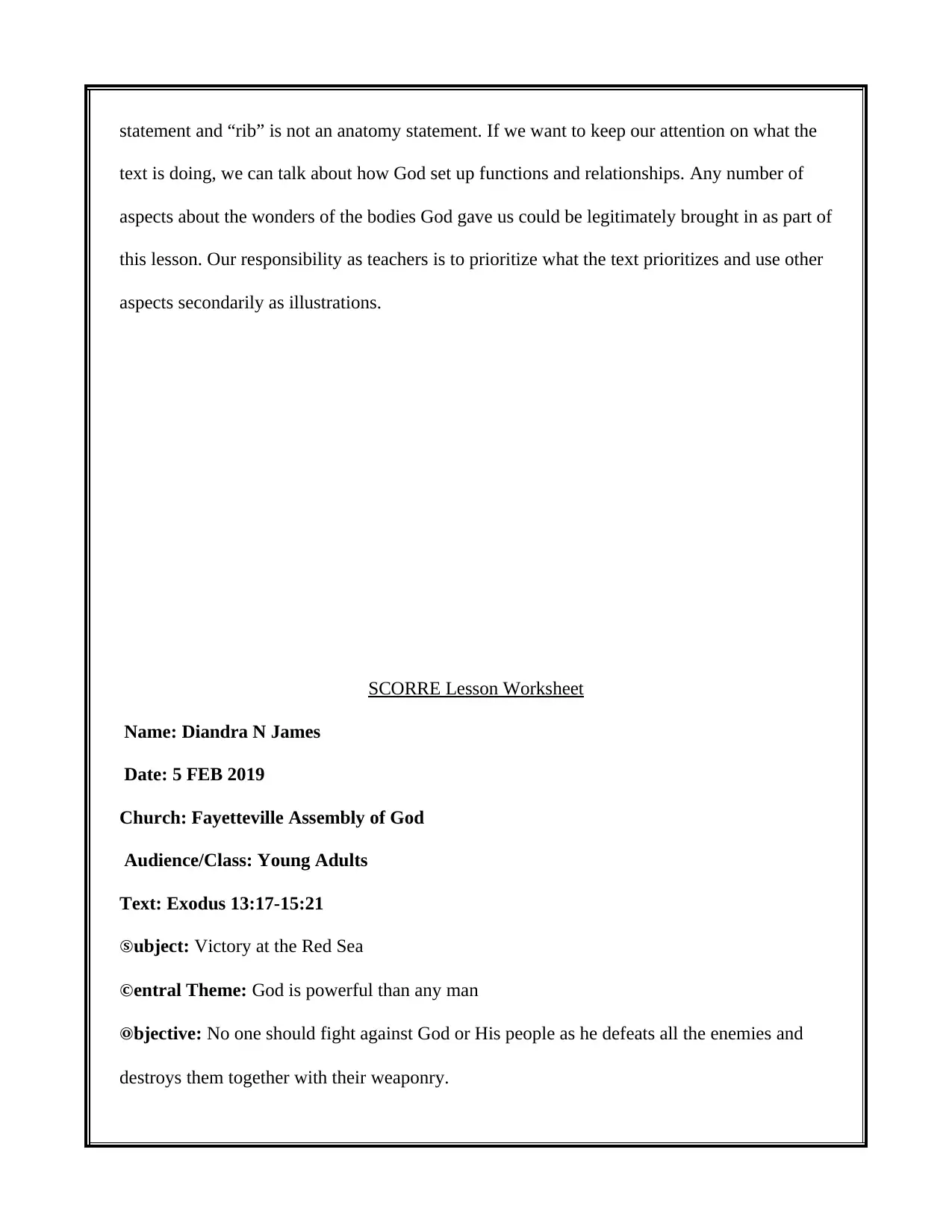
statement and “rib” is not an anatomy statement. If we want to keep our attention on what the
text is doing, we can talk about how God set up functions and relationships. Any number of
aspects about the wonders of the bodies God gave us could be legitimately brought in as part of
this lesson. Our responsibility as teachers is to prioritize what the text prioritizes and use other
aspects secondarily as illustrations.
SCORRE Lesson Worksheet
Name: Diandra N James
Date: 5 FEB 2019
Church: Fayetteville Assembly of God
Audience/Class: Young Adults
Text: Exodus 13:17-15:21
Ⓢubject: Victory at the Red Sea
Ⓒentral Theme: God is powerful than any man
Ⓞbjective: No one should fight against God or His people as he defeats all the enemies and
destroys them together with their weaponry.
text is doing, we can talk about how God set up functions and relationships. Any number of
aspects about the wonders of the bodies God gave us could be legitimately brought in as part of
this lesson. Our responsibility as teachers is to prioritize what the text prioritizes and use other
aspects secondarily as illustrations.
SCORRE Lesson Worksheet
Name: Diandra N James
Date: 5 FEB 2019
Church: Fayetteville Assembly of God
Audience/Class: Young Adults
Text: Exodus 13:17-15:21
Ⓢubject: Victory at the Red Sea
Ⓒentral Theme: God is powerful than any man
Ⓞbjective: No one should fight against God or His people as he defeats all the enemies and
destroys them together with their weaponry.
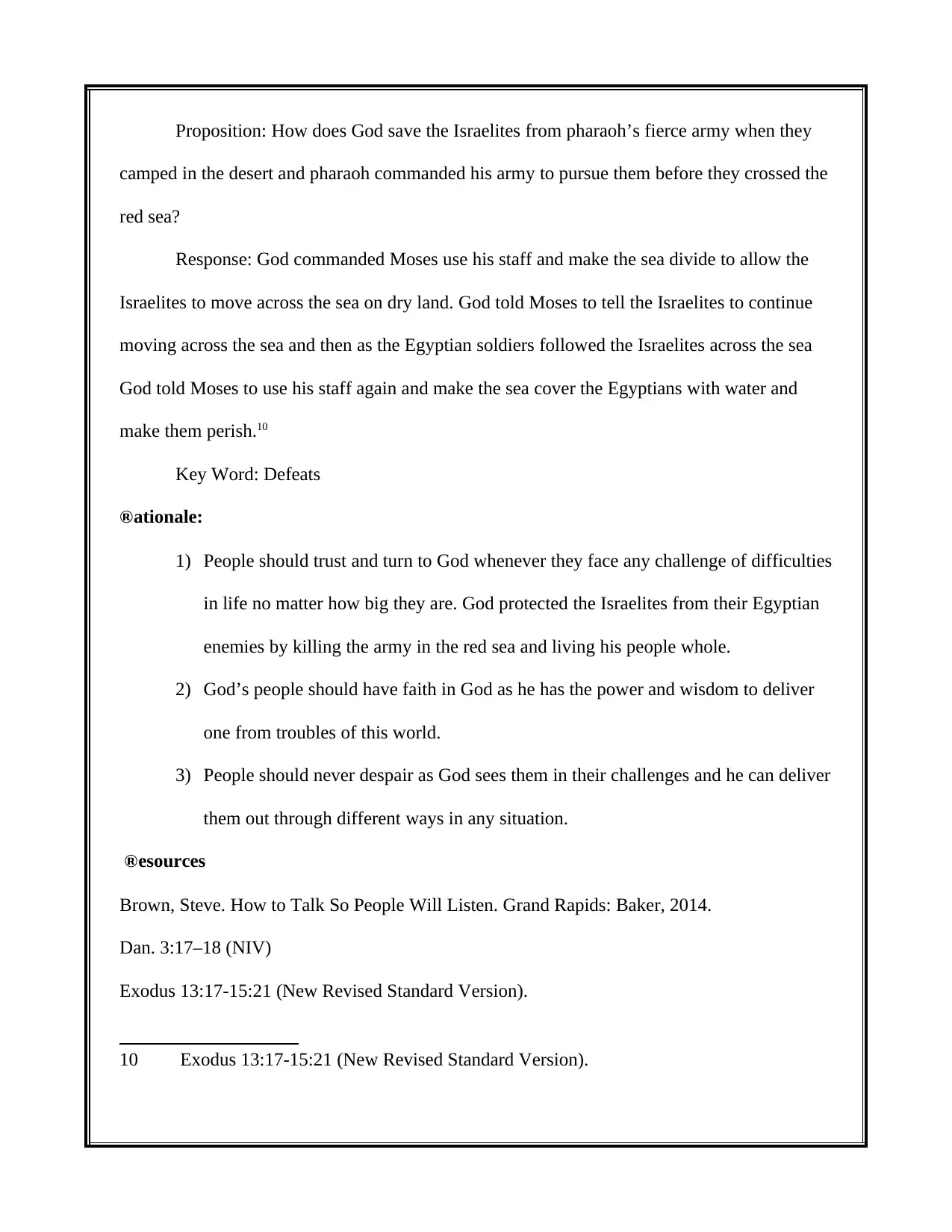
Proposition: How does God save the Israelites from pharaoh’s fierce army when they
camped in the desert and pharaoh commanded his army to pursue them before they crossed the
red sea?
Response: God commanded Moses use his staff and make the sea divide to allow the
Israelites to move across the sea on dry land. God told Moses to tell the Israelites to continue
moving across the sea and then as the Egyptian soldiers followed the Israelites across the sea
God told Moses to use his staff again and make the sea cover the Egyptians with water and
make them perish.10
Key Word: Defeats
Ⓡationale:
1) People should trust and turn to God whenever they face any challenge of difficulties
in life no matter how big they are. God protected the Israelites from their Egyptian
enemies by killing the army in the red sea and living his people whole.
2) God’s people should have faith in God as he has the power and wisdom to deliver
one from troubles of this world.
3) People should never despair as God sees them in their challenges and he can deliver
them out through different ways in any situation.
Ⓡesources
Brown, Steve. How to Talk So People Will Listen. Grand Rapids: Baker, 2014.
Dan. 3:17–18 (NIV)
Exodus 13:17-15:21 (New Revised Standard Version).
10 Exodus 13:17-15:21 (New Revised Standard Version).
camped in the desert and pharaoh commanded his army to pursue them before they crossed the
red sea?
Response: God commanded Moses use his staff and make the sea divide to allow the
Israelites to move across the sea on dry land. God told Moses to tell the Israelites to continue
moving across the sea and then as the Egyptian soldiers followed the Israelites across the sea
God told Moses to use his staff again and make the sea cover the Egyptians with water and
make them perish.10
Key Word: Defeats
Ⓡationale:
1) People should trust and turn to God whenever they face any challenge of difficulties
in life no matter how big they are. God protected the Israelites from their Egyptian
enemies by killing the army in the red sea and living his people whole.
2) God’s people should have faith in God as he has the power and wisdom to deliver
one from troubles of this world.
3) People should never despair as God sees them in their challenges and he can deliver
them out through different ways in any situation.
Ⓡesources
Brown, Steve. How to Talk So People Will Listen. Grand Rapids: Baker, 2014.
Dan. 3:17–18 (NIV)
Exodus 13:17-15:21 (New Revised Standard Version).
10 Exodus 13:17-15:21 (New Revised Standard Version).
⊘ This is a preview!⊘
Do you want full access?
Subscribe today to unlock all pages.

Trusted by 1+ million students worldwide
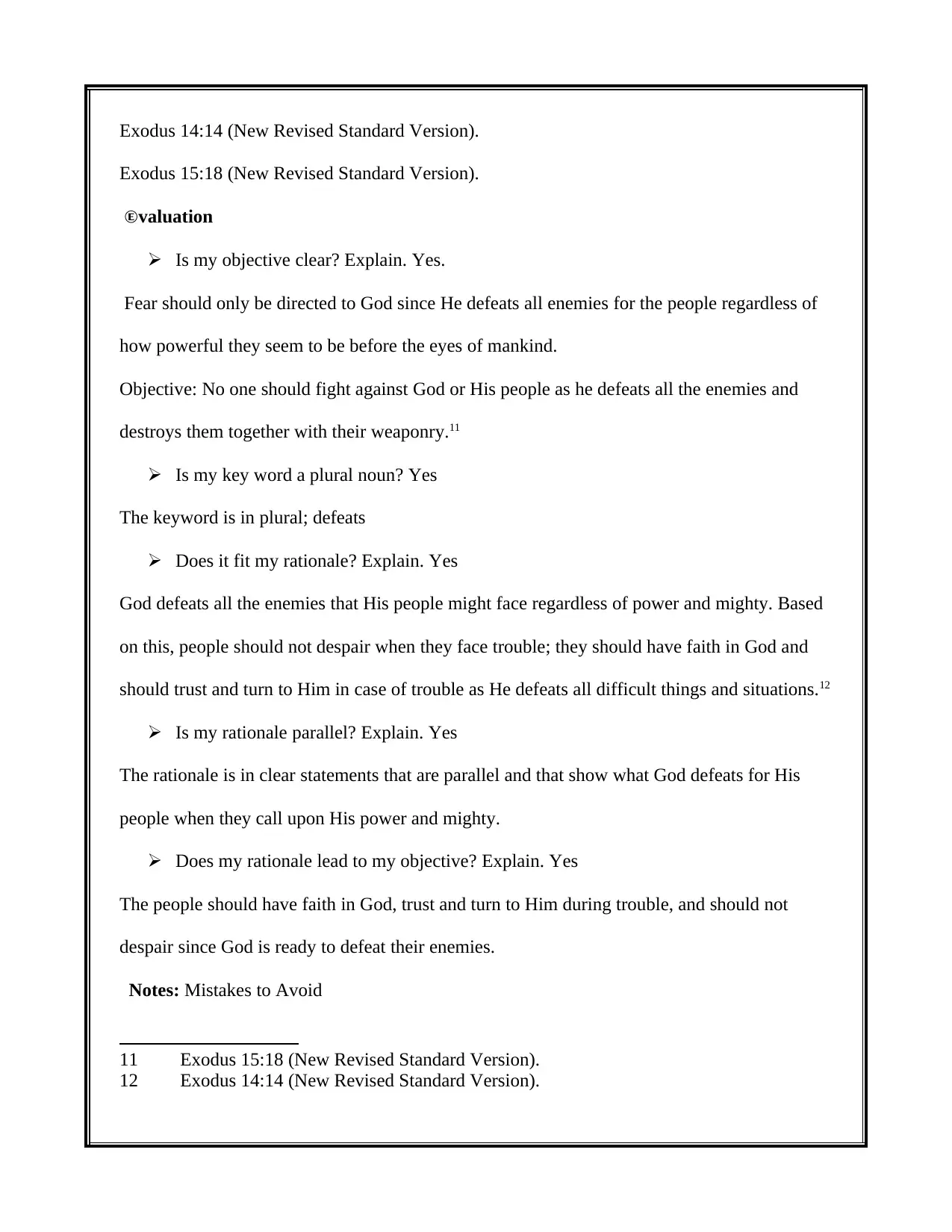
Exodus 14:14 (New Revised Standard Version).
Exodus 15:18 (New Revised Standard Version).
Ⓔvaluation
Is my objective clear? Explain. Yes.
Fear should only be directed to God since He defeats all enemies for the people regardless of
how powerful they seem to be before the eyes of mankind.
Objective: No one should fight against God or His people as he defeats all the enemies and
destroys them together with their weaponry.11
Is my key word a plural noun? Yes
The keyword is in plural; defeats
Does it fit my rationale? Explain. Yes
God defeats all the enemies that His people might face regardless of power and mighty. Based
on this, people should not despair when they face trouble; they should have faith in God and
should trust and turn to Him in case of trouble as He defeats all difficult things and situations.12
Is my rationale parallel? Explain. Yes
The rationale is in clear statements that are parallel and that show what God defeats for His
people when they call upon His power and mighty.
Does my rationale lead to my objective? Explain. Yes
The people should have faith in God, trust and turn to Him during trouble, and should not
despair since God is ready to defeat their enemies.
Notes: Mistakes to Avoid
11 Exodus 15:18 (New Revised Standard Version).
12 Exodus 14:14 (New Revised Standard Version).
Exodus 15:18 (New Revised Standard Version).
Ⓔvaluation
Is my objective clear? Explain. Yes.
Fear should only be directed to God since He defeats all enemies for the people regardless of
how powerful they seem to be before the eyes of mankind.
Objective: No one should fight against God or His people as he defeats all the enemies and
destroys them together with their weaponry.11
Is my key word a plural noun? Yes
The keyword is in plural; defeats
Does it fit my rationale? Explain. Yes
God defeats all the enemies that His people might face regardless of power and mighty. Based
on this, people should not despair when they face trouble; they should have faith in God and
should trust and turn to Him in case of trouble as He defeats all difficult things and situations.12
Is my rationale parallel? Explain. Yes
The rationale is in clear statements that are parallel and that show what God defeats for His
people when they call upon His power and mighty.
Does my rationale lead to my objective? Explain. Yes
The people should have faith in God, trust and turn to Him during trouble, and should not
despair since God is ready to defeat their enemies.
Notes: Mistakes to Avoid
11 Exodus 15:18 (New Revised Standard Version).
12 Exodus 14:14 (New Revised Standard Version).
Paraphrase This Document
Need a fresh take? Get an instant paraphrase of this document with our AI Paraphraser
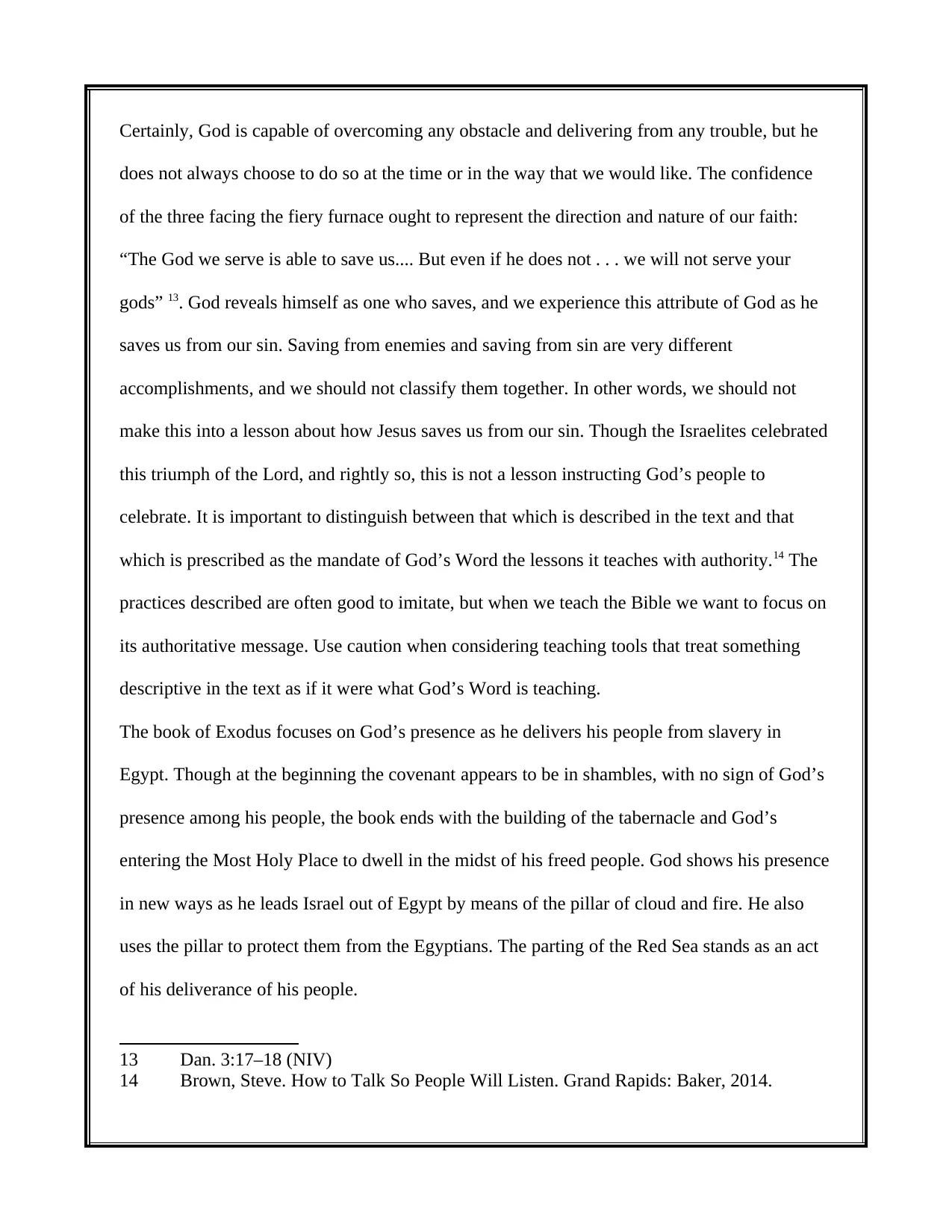
Certainly, God is capable of overcoming any obstacle and delivering from any trouble, but he
does not always choose to do so at the time or in the way that we would like. The confidence
of the three facing the fiery furnace ought to represent the direction and nature of our faith:
“The God we serve is able to save us.... But even if he does not . . . we will not serve your
gods” 13. God reveals himself as one who saves, and we experience this attribute of God as he
saves us from our sin. Saving from enemies and saving from sin are very different
accomplishments, and we should not classify them together. In other words, we should not
make this into a lesson about how Jesus saves us from our sin. Though the Israelites celebrated
this triumph of the Lord, and rightly so, this is not a lesson instructing God’s people to
celebrate. It is important to distinguish between that which is described in the text and that
which is prescribed as the mandate of God’s Word the lessons it teaches with authority.14 The
practices described are often good to imitate, but when we teach the Bible we want to focus on
its authoritative message. Use caution when considering teaching tools that treat something
descriptive in the text as if it were what God’s Word is teaching.
The book of Exodus focuses on God’s presence as he delivers his people from slavery in
Egypt. Though at the beginning the covenant appears to be in shambles, with no sign of God’s
presence among his people, the book ends with the building of the tabernacle and God’s
entering the Most Holy Place to dwell in the midst of his freed people. God shows his presence
in new ways as he leads Israel out of Egypt by means of the pillar of cloud and fire. He also
uses the pillar to protect them from the Egyptians. The parting of the Red Sea stands as an act
of his deliverance of his people.
13 Dan. 3:17–18 (NIV)
14 Brown, Steve. How to Talk So People Will Listen. Grand Rapids: Baker, 2014.
does not always choose to do so at the time or in the way that we would like. The confidence
of the three facing the fiery furnace ought to represent the direction and nature of our faith:
“The God we serve is able to save us.... But even if he does not . . . we will not serve your
gods” 13. God reveals himself as one who saves, and we experience this attribute of God as he
saves us from our sin. Saving from enemies and saving from sin are very different
accomplishments, and we should not classify them together. In other words, we should not
make this into a lesson about how Jesus saves us from our sin. Though the Israelites celebrated
this triumph of the Lord, and rightly so, this is not a lesson instructing God’s people to
celebrate. It is important to distinguish between that which is described in the text and that
which is prescribed as the mandate of God’s Word the lessons it teaches with authority.14 The
practices described are often good to imitate, but when we teach the Bible we want to focus on
its authoritative message. Use caution when considering teaching tools that treat something
descriptive in the text as if it were what God’s Word is teaching.
The book of Exodus focuses on God’s presence as he delivers his people from slavery in
Egypt. Though at the beginning the covenant appears to be in shambles, with no sign of God’s
presence among his people, the book ends with the building of the tabernacle and God’s
entering the Most Holy Place to dwell in the midst of his freed people. God shows his presence
in new ways as he leads Israel out of Egypt by means of the pillar of cloud and fire. He also
uses the pillar to protect them from the Egyptians. The parting of the Red Sea stands as an act
of his deliverance of his people.
13 Dan. 3:17–18 (NIV)
14 Brown, Steve. How to Talk So People Will Listen. Grand Rapids: Baker, 2014.

⊘ This is a preview!⊘
Do you want full access?
Subscribe today to unlock all pages.

Trusted by 1+ million students worldwide
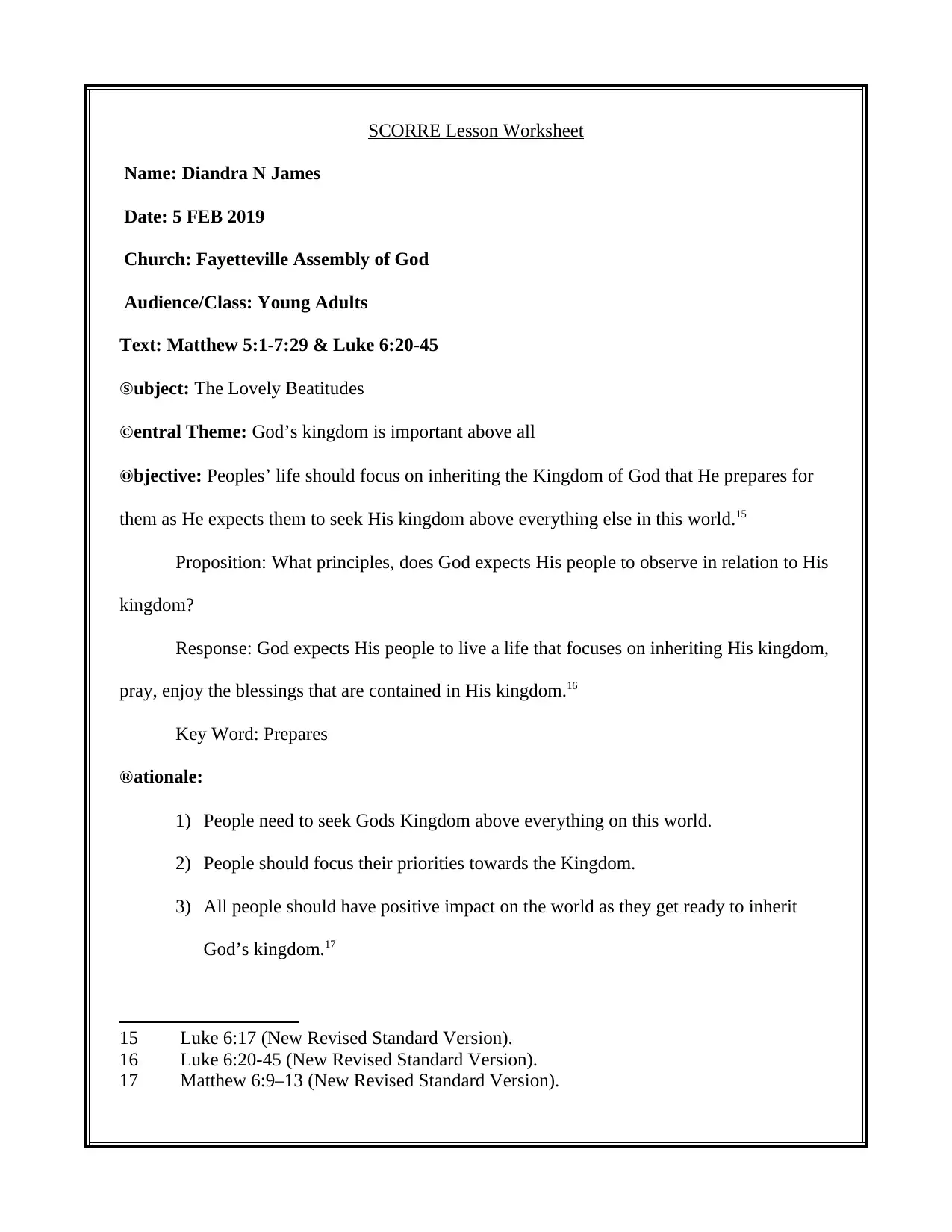
SCORRE Lesson Worksheet
Name: Diandra N James
Date: 5 FEB 2019
Church: Fayetteville Assembly of God
Audience/Class: Young Adults
Text: Matthew 5:1-7:29 & Luke 6:20-45
Ⓢubject: The Lovely Beatitudes
Ⓒentral Theme: God’s kingdom is important above all
Ⓞbjective: Peoples’ life should focus on inheriting the Kingdom of God that He prepares for
them as He expects them to seek His kingdom above everything else in this world.15
Proposition: What principles, does God expects His people to observe in relation to His
kingdom?
Response: God expects His people to live a life that focuses on inheriting His kingdom,
pray, enjoy the blessings that are contained in His kingdom.16
Key Word: Prepares
Ⓡationale:
1) People need to seek Gods Kingdom above everything on this world.
2) People should focus their priorities towards the Kingdom.
3) All people should have positive impact on the world as they get ready to inherit
God’s kingdom.17
15 Luke 6:17 (New Revised Standard Version).
16 Luke 6:20-45 (New Revised Standard Version).
17 Matthew 6:9–13 (New Revised Standard Version).
Name: Diandra N James
Date: 5 FEB 2019
Church: Fayetteville Assembly of God
Audience/Class: Young Adults
Text: Matthew 5:1-7:29 & Luke 6:20-45
Ⓢubject: The Lovely Beatitudes
Ⓒentral Theme: God’s kingdom is important above all
Ⓞbjective: Peoples’ life should focus on inheriting the Kingdom of God that He prepares for
them as He expects them to seek His kingdom above everything else in this world.15
Proposition: What principles, does God expects His people to observe in relation to His
kingdom?
Response: God expects His people to live a life that focuses on inheriting His kingdom,
pray, enjoy the blessings that are contained in His kingdom.16
Key Word: Prepares
Ⓡationale:
1) People need to seek Gods Kingdom above everything on this world.
2) People should focus their priorities towards the Kingdom.
3) All people should have positive impact on the world as they get ready to inherit
God’s kingdom.17
15 Luke 6:17 (New Revised Standard Version).
16 Luke 6:20-45 (New Revised Standard Version).
17 Matthew 6:9–13 (New Revised Standard Version).
Paraphrase This Document
Need a fresh take? Get an instant paraphrase of this document with our AI Paraphraser
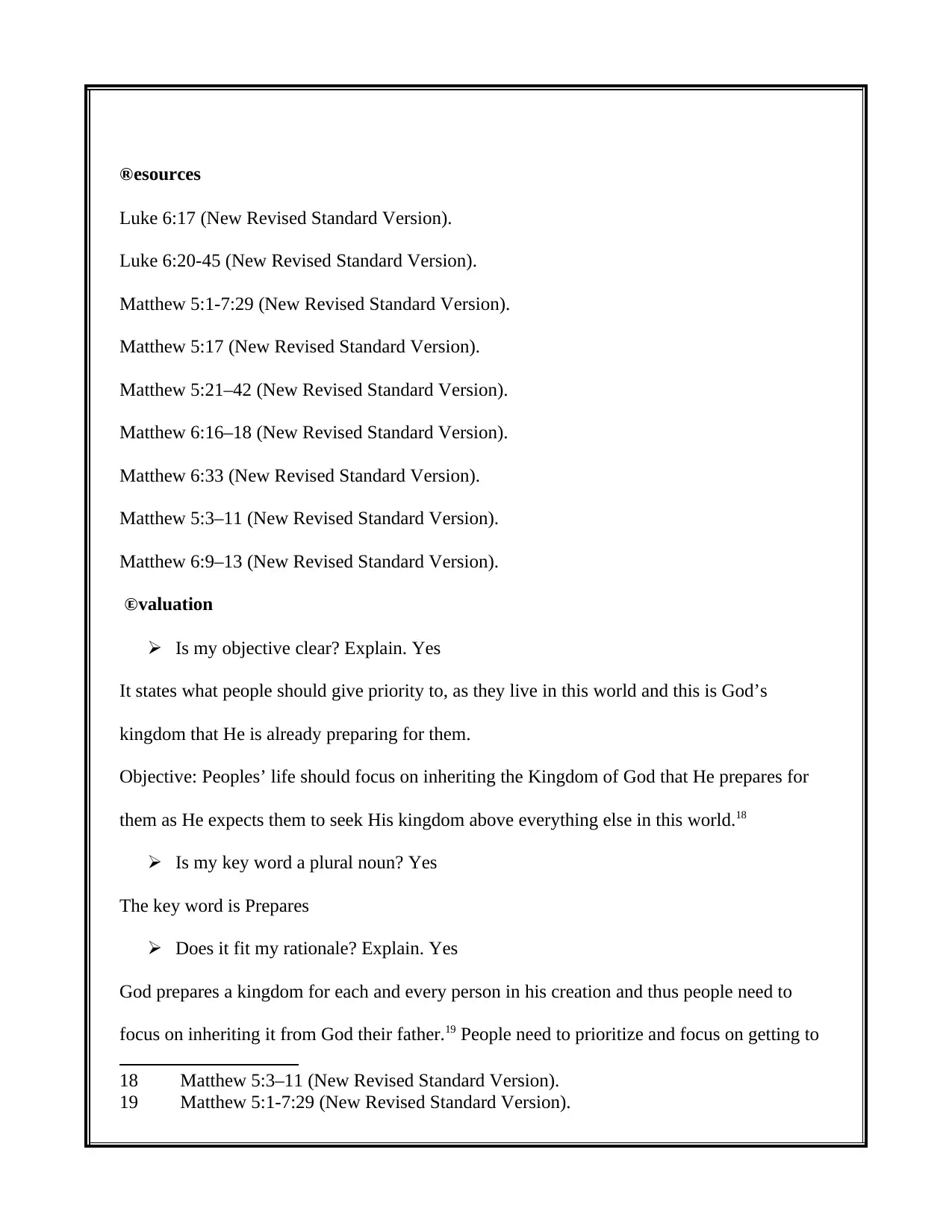
Ⓡesources
Luke 6:17 (New Revised Standard Version).
Luke 6:20-45 (New Revised Standard Version).
Matthew 5:1-7:29 (New Revised Standard Version).
Matthew 5:17 (New Revised Standard Version).
Matthew 5:21–42 (New Revised Standard Version).
Matthew 6:16–18 (New Revised Standard Version).
Matthew 6:33 (New Revised Standard Version).
Matthew 5:3–11 (New Revised Standard Version).
Matthew 6:9–13 (New Revised Standard Version).
Ⓔvaluation
Is my objective clear? Explain. Yes
It states what people should give priority to, as they live in this world and this is God’s
kingdom that He is already preparing for them.
Objective: Peoples’ life should focus on inheriting the Kingdom of God that He prepares for
them as He expects them to seek His kingdom above everything else in this world.18
Is my key word a plural noun? Yes
The key word is Prepares
Does it fit my rationale? Explain. Yes
God prepares a kingdom for each and every person in his creation and thus people need to
focus on inheriting it from God their father.19 People need to prioritize and focus on getting to
18 Matthew 5:3–11 (New Revised Standard Version).
19 Matthew 5:1-7:29 (New Revised Standard Version).
Luke 6:17 (New Revised Standard Version).
Luke 6:20-45 (New Revised Standard Version).
Matthew 5:1-7:29 (New Revised Standard Version).
Matthew 5:17 (New Revised Standard Version).
Matthew 5:21–42 (New Revised Standard Version).
Matthew 6:16–18 (New Revised Standard Version).
Matthew 6:33 (New Revised Standard Version).
Matthew 5:3–11 (New Revised Standard Version).
Matthew 6:9–13 (New Revised Standard Version).
Ⓔvaluation
Is my objective clear? Explain. Yes
It states what people should give priority to, as they live in this world and this is God’s
kingdom that He is already preparing for them.
Objective: Peoples’ life should focus on inheriting the Kingdom of God that He prepares for
them as He expects them to seek His kingdom above everything else in this world.18
Is my key word a plural noun? Yes
The key word is Prepares
Does it fit my rationale? Explain. Yes
God prepares a kingdom for each and every person in his creation and thus people need to
focus on inheriting it from God their father.19 People need to prioritize and focus on getting to
18 Matthew 5:3–11 (New Revised Standard Version).
19 Matthew 5:1-7:29 (New Revised Standard Version).
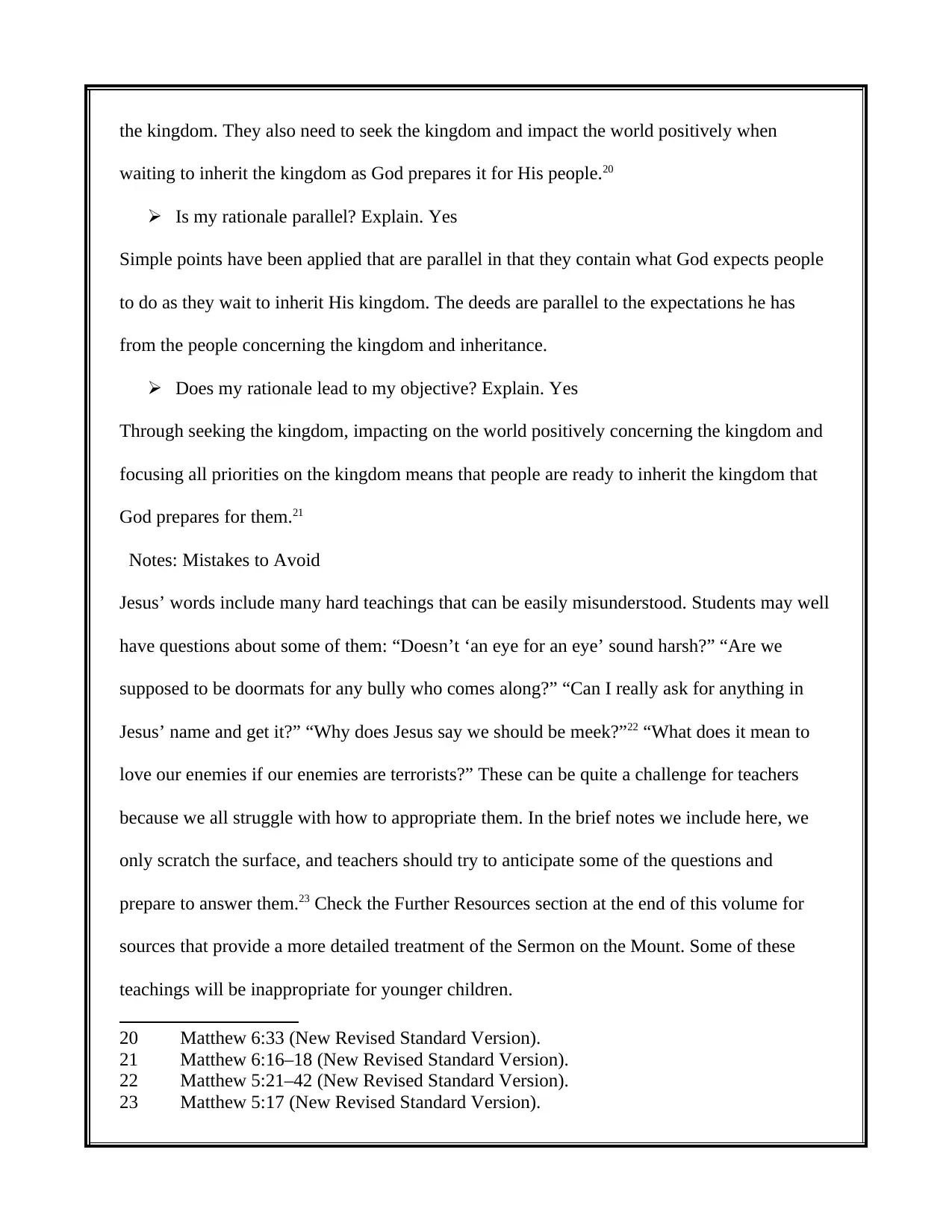
the kingdom. They also need to seek the kingdom and impact the world positively when
waiting to inherit the kingdom as God prepares it for His people.20
Is my rationale parallel? Explain. Yes
Simple points have been applied that are parallel in that they contain what God expects people
to do as they wait to inherit His kingdom. The deeds are parallel to the expectations he has
from the people concerning the kingdom and inheritance.
Does my rationale lead to my objective? Explain. Yes
Through seeking the kingdom, impacting on the world positively concerning the kingdom and
focusing all priorities on the kingdom means that people are ready to inherit the kingdom that
God prepares for them.21
Notes: Mistakes to Avoid
Jesus’ words include many hard teachings that can be easily misunderstood. Students may well
have questions about some of them: “Doesn’t ‘an eye for an eye’ sound harsh?” “Are we
supposed to be doormats for any bully who comes along?” “Can I really ask for anything in
Jesus’ name and get it?” “Why does Jesus say we should be meek?”22 “What does it mean to
love our enemies if our enemies are terrorists?” These can be quite a challenge for teachers
because we all struggle with how to appropriate them. In the brief notes we include here, we
only scratch the surface, and teachers should try to anticipate some of the questions and
prepare to answer them.23 Check the Further Resources section at the end of this volume for
sources that provide a more detailed treatment of the Sermon on the Mount. Some of these
teachings will be inappropriate for younger children.
20 Matthew 6:33 (New Revised Standard Version).
21 Matthew 6:16–18 (New Revised Standard Version).
22 Matthew 5:21–42 (New Revised Standard Version).
23 Matthew 5:17 (New Revised Standard Version).
waiting to inherit the kingdom as God prepares it for His people.20
Is my rationale parallel? Explain. Yes
Simple points have been applied that are parallel in that they contain what God expects people
to do as they wait to inherit His kingdom. The deeds are parallel to the expectations he has
from the people concerning the kingdom and inheritance.
Does my rationale lead to my objective? Explain. Yes
Through seeking the kingdom, impacting on the world positively concerning the kingdom and
focusing all priorities on the kingdom means that people are ready to inherit the kingdom that
God prepares for them.21
Notes: Mistakes to Avoid
Jesus’ words include many hard teachings that can be easily misunderstood. Students may well
have questions about some of them: “Doesn’t ‘an eye for an eye’ sound harsh?” “Are we
supposed to be doormats for any bully who comes along?” “Can I really ask for anything in
Jesus’ name and get it?” “Why does Jesus say we should be meek?”22 “What does it mean to
love our enemies if our enemies are terrorists?” These can be quite a challenge for teachers
because we all struggle with how to appropriate them. In the brief notes we include here, we
only scratch the surface, and teachers should try to anticipate some of the questions and
prepare to answer them.23 Check the Further Resources section at the end of this volume for
sources that provide a more detailed treatment of the Sermon on the Mount. Some of these
teachings will be inappropriate for younger children.
20 Matthew 6:33 (New Revised Standard Version).
21 Matthew 6:16–18 (New Revised Standard Version).
22 Matthew 5:21–42 (New Revised Standard Version).
23 Matthew 5:17 (New Revised Standard Version).
⊘ This is a preview!⊘
Do you want full access?
Subscribe today to unlock all pages.

Trusted by 1+ million students worldwide
1 out of 20
Related Documents
Your All-in-One AI-Powered Toolkit for Academic Success.
+13062052269
info@desklib.com
Available 24*7 on WhatsApp / Email
![[object Object]](/_next/static/media/star-bottom.7253800d.svg)
Unlock your academic potential
Copyright © 2020–2026 A2Z Services. All Rights Reserved. Developed and managed by ZUCOL.


![Biblical Analysis: Old Testament Theology Essay - [University Name]](/_next/image/?url=https%3A%2F%2Fdesklib.com%2Fmedia%2Fold-testament-theology_page_1.jpg&w=256&q=75)


